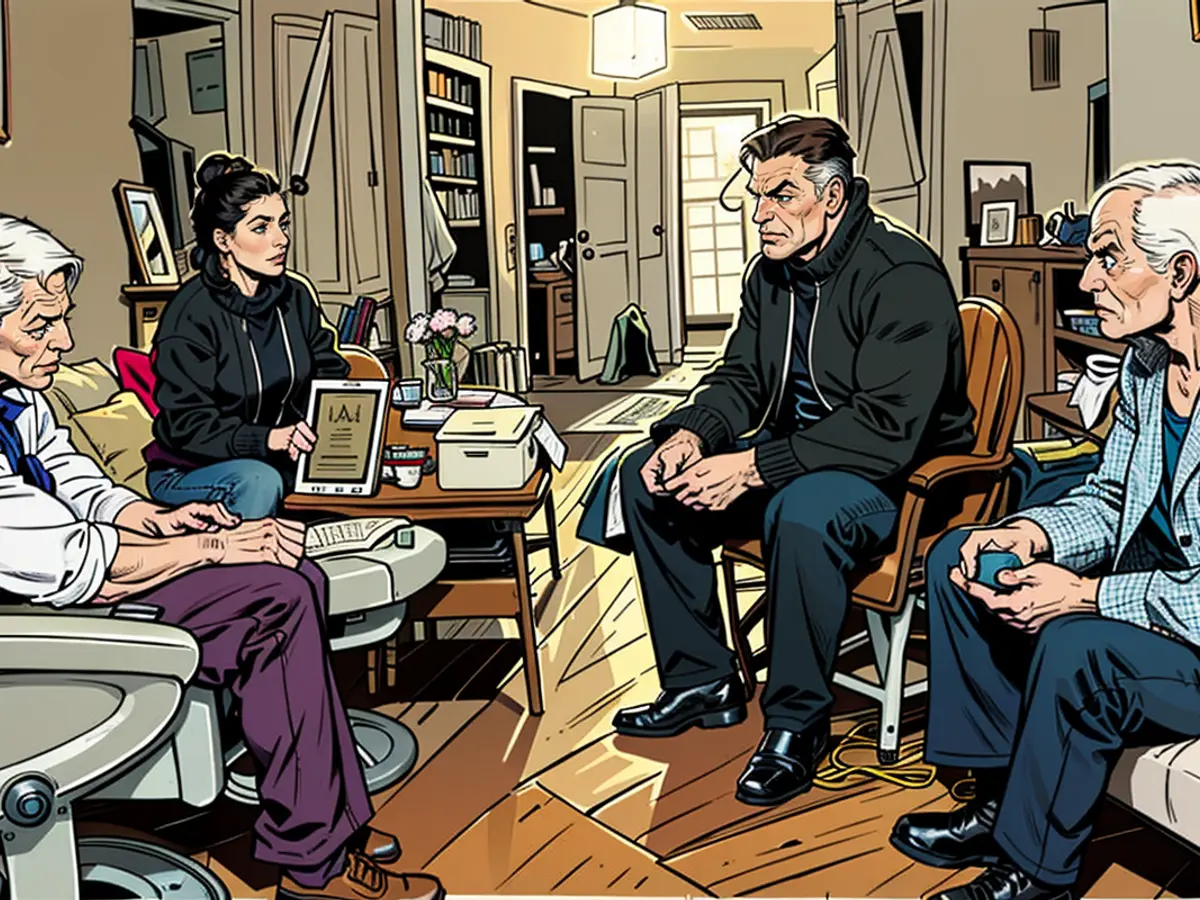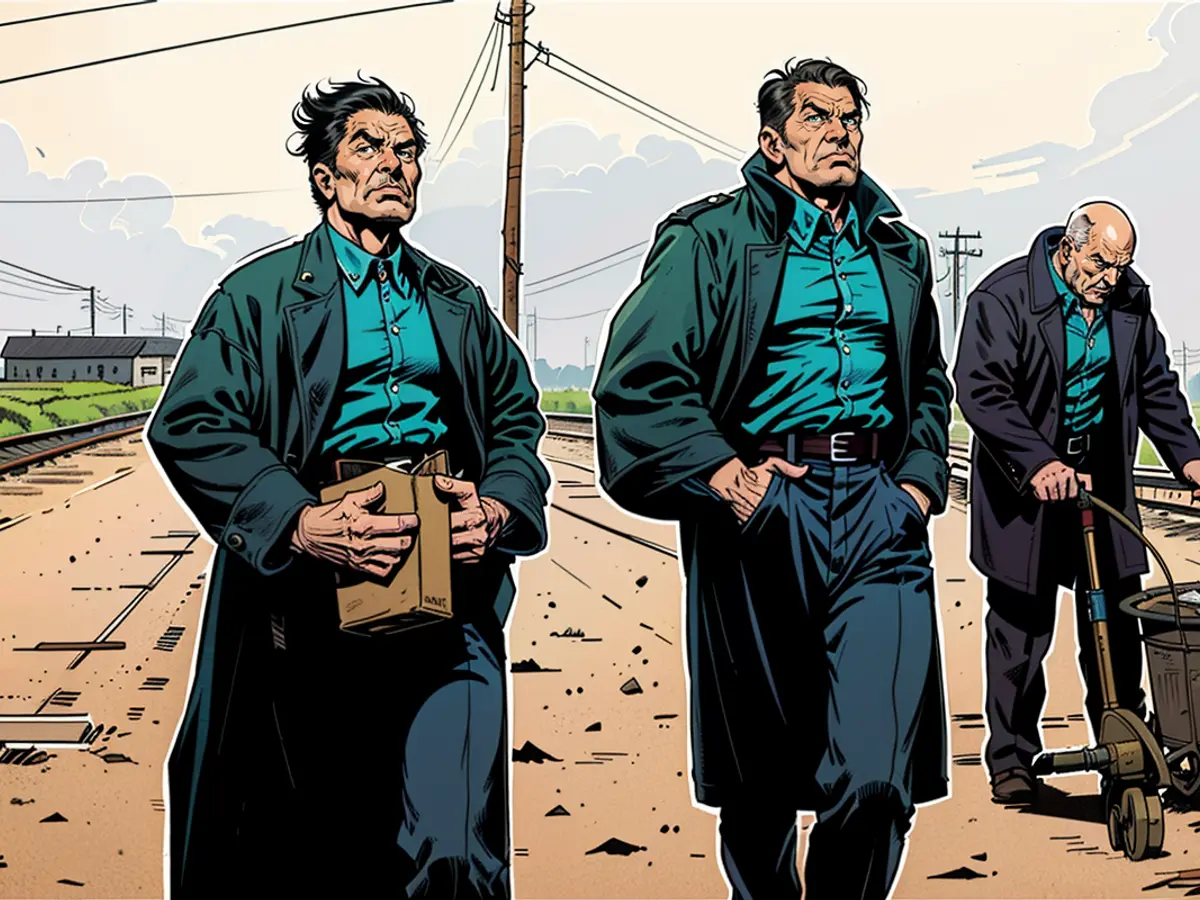Language holds no significance in Auschwitz.
In the documentary "In the Shadow of the Commander," Maya Lasker-Wallfisch sets out on a journey to uncover her family's past. She is the daughter of Auschwitz survivor Anita Lasker-Wallfisch, who explored her Jewish-German roots. The film tackles the ripple effects of Nazi atrocities on future generations. Maya and her mother encounter the grandchildren of Rudolf Hoess—the Auschwitz concentration and extermination camp's commander. Hoess was responsible for the deaths of over a million Jewish women and men. Reflecting on meeting Hoess' descendants, Maya expressed her apprehension: "I didn't know how I would feel in their presence," Maya shared in an interview on ntv.de. "The silence was the most profound moment between us."
ntv.de: During the filming of this documentary, director Daniela Völker accompanied Maya during her relocation to Germany in 2020. Why did you choose to relocate to Germany?
Maya Lasker-Wallfisch: I was born in London as the child of a German-Jewish Holocaust survivor. All my life, I had always felt like an outsider. It wasn't until I was 50 and began exploring transgenerational trauma that I recognized my responsibility over my mother's legacy. I needed to understand my origins and determine if Germany would serve as a home for me. My experience in Germany has been challenging, yet ultimately worthwhile.
Since October 7, 2023—what has changed for you?
Prior to that, I'd never been terrified of being a Jew. During the initial months afterward, I was afraid. However, I eventually became used to it, and the fear slowly subsided. Living in a wartime environment is taxing, yet I feel safe. Antisemitism runs rampant in various countries, but in Germany, it physically affects me. Witnessing swastikas in London is unimaginably horrifying. Here, the sight is overwhelming.
Do you feel at home in Germany?
I'm unsure. To this day, I'm unclear about the definition of "belonging." I seek inclusion and fear being forgotten. My arrival in Germany was strange. Initially, I struggled with strangers referencing me as "Mrs. Lasker-Wallfisch." Eventually, I realized that my name was indeed mine. I would like to honor my mother's work while contributing in my own manner.
Anita Lasker-Wallfisch, having escaped the concentration camp, migrated to London in 1945. While filming, she accompanied you in Berlin. How was this reunion for both of you?
Visiting my Berlin apartment, my mother declared it eerie. Despite her disquietude, she also appeared impressed. Memories surfaced that she had formerly withheld from me or hadn't been able to recall. Similarities between my apartment and her childhood home in Breslau provided a poignant reminder of a lost era.
You lost your grandparents in Izbica in 1942 and decided to visit in Poland. Why did you do this?
No one encouraged me to visit Izbica. I simply had to go. It was a responsibility to honor my grandparents' lives. My journey left personal traces behind. It would've been more private had it not been for the cameras. Regardless, it was an intensely personal encounter.
Which scene in the documentary resonated with you the most?
Every aspect of the filming moved me in some way. Each moment was emotional, touching, harsh, and bewildering from start to finish.
What proved to be the most challenging aspect?
There were no detached moments throughout the creation process. However, the most profound moments were those not shown in the film. Most likely, the audience will be moved by the descendants' encounter: Hans-Jürgen Höss and Kai Höss—the son and grandson of Rudolf Höss—traveled to London to meet with Maya and her mother. It was a crucial historical event. Maya was impressed by the graciousness and humanity they displayed.
Not knowing how to react in their company, I couldn't brace myself for the meeting. As soon as we stood confronting one another, I recognized their pain as unexpressible and still unprocessed on any level. It felt like a significant duty to help them accept the facts about their family history. I felt like I needed to take care of them. Hans-Jürgen Höss and Kai Höss owned all the emotions.
What did you do to care for them?
In that instance, I acted as the therapist and the facilitator. I saw myself as a gauge. There's no room for language in Auschwitz. There are no words fit enough for that. Hans-Jürgen Höss and Kai Höss attempted to fill the silence with words. I assisted them in understanding that words were unnecessary. It was not always easy. It was only when it became quiet that we had room to feel. The silence was the most affecting moment shared between us.
Is silence an essential aspect of the film, and how does it relate to the memory of the Holocaust?
Several survivors have remained mum about their traumatic experiences for a very long time. After their liberation, my mother and her sister Renate wanted to speak out. However, the world was far from ready to inquire. Consequently, they settled in the "land of silence." They also stayed silent in front of us, their children. Although I sensed something amiss, I could never comprehend exactly what it was - a kind of shadowy secret. Thus, the trauma passed down to me. My mom wanted to protect my older brother and me. As a child, I occasionally questioned my mother about the number on her arm. She repeatedly responded, "I'll tell you when you're older." But that moment never really arrived.
How did you discover more about your mother's past?
When I was a teenager rummaging for cigarettes in a closet, a pile of photographs tumbled out. The photos surrounded me. I didn't fathom what I was witnessing. When I realized I was viewing corpses and frightful images that I am now intimately familiar with, I shuddered and replaced everything back in the closet. I didn't divulge this information for a decade.
Did you embark on a journey to become a psychoanalyst because you inherited the trauma of your mother?
I have always been a curious individual who is interested in others. I managed to evade formal education for a considerable time, busy with different endeavors. I didn't initiate my training to become a psychoanalyst until I was nearly 40 years old.
How do you manage the trauma now?
There are some days that seem easier for me, while others are more challenging. My wounds run deep. When I refer to pain, I think it's something distinct. People see what they want to see - the successful psychotherapist and the author, not the conflict that unfolds with it. I belong to a family of Holocaust survivors. I am part of the second generation. I'm highly preoccupied with issues of belonging and security. I'm exploring where I fit in and in the world. My trauma derives not from a personal experience but from my mother, who passed it down to me.

Read also:
- Maya Lasker-Wallfisch's film "Film - ORDNER" serves as a commemoration of her family's history, including the Holocaust and their connection to Germany and the Auschwitz concentration camp.
- In Berlin, Maya Lasker-Wallfisch visited historical sites, such as the Auschwitz Memorial, as part of her personal journey to learn more about her Jewish-German heritage and her mother's experiences during National Socialism.
- The documentary "In the Shadow of the Commander" delves into the complex themes of entertainment and history by exploring the ripple effects of Nazi atrocities on future generations and the uncomfortable encounter between Maya Lasker-Wallfisch and the descendants of Auschwitz commander Rudolf Hoess.
- The city of Wroclaw in Poland, where Maya Lasker-Wallfisch's grandparents were killed, has a significant role in the film, as she returns to the site to honor their memory and commemorate the Holocaust.
- Berlin has undertaken various initiatives to address historical issues related to the Holocaust and Nazi atrocities, which have included educational programs and initiatives to promote understanding and confront anti-Semitism.
- In Germany, the topic of Judaism and the Holocaust is often treated with sensitivity, reflected in both private and public spaces, as individuals continue to grapple with this dark period in history.







